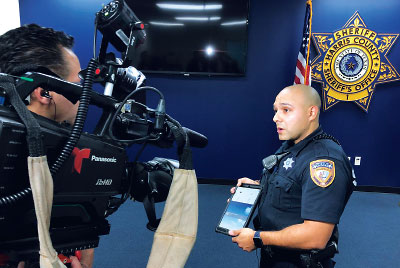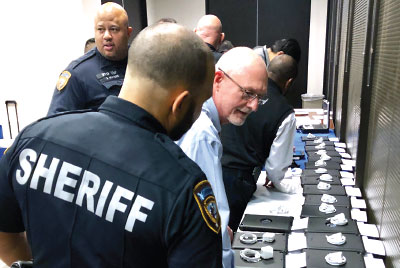Texas County Pilots Telehealth Crisis Response Program
Abstract
The use of an iPad can extend the expertise of psychiatrists and other mental health professionals when Harris County deputies encounter situations that involve people with mental illness.
Harris County (Texas) Sheriff’s Deputy Donald Hess is en route to deal with an impending mental health crisis. A mother called in to report that her teenage daughter, who has depression, has begun acting suicidal. As a member of the county’s Crisis Intervention Response Team (CIRT)—in which police are partnered with licensed counselors to defuse tense situations involving people with mental illness—Hess is well trained for this moment. Today’s call is a little different, however. His regular partner is not seated next to him; rather, Hess is arriving on the scene with an iPad.

Harris County Deputy Jose Gomez speaks to local news about his experiences using tablets to connect with mental health counselors when he is out in the field.
After speaking briefly with the frantic mother, Hess hands her the iPad. On the screen is a psychiatrist prepared to ascertain the situation and speak with both the mother and daughter. The crisis gets resolved, and Hess brings the daughter to Houston’s Ben Taub Hospital for psychiatric evaluation and treatment.
The above encounter was one of the first calls handled as part of the Harris County Sheriff’s Office (HCSO) pilot program with telepsychiatry-based crisis intervention. First initiated in December 2017 with some preliminary trials to test the hardware and other logistics, the telepsychiatry program launched in earnest in December 2018 with 20 deputies using telepsychiatry in the field for one year.
Carried out in conjunction with the Harris Center for Mental Health and IDD (Intellectual and Developmental Disability), this program is believed to be one of the first in the country to incorporate telepsychiatry into crisis response. That it’s taking place in Harris County, which encompasses the city of Houston and the surrounding area, may not be surprising—Harris County was also one of the first jurisdictions to establish in-person CIRT teams to triage psychiatric crises a decade ago.
“Our co-responder units have done a great job handling some very serious calls,” said Frank Webb, a retired Houston police officer and project manager for HSCO’s Mental Health and Jail Diversion Bureau. But with over 1,700 square miles to cover and 5 million inhabitants, resources were being stretched very thin.
“We thought if we took some of our counselors out of their cars and put them in front of monitors, they could each support 15 to 20 deputies a shift instead of just one or two,” said Wayne Young, M.B.A., CEO of the Harris Center. “That would be a real force multiplier.”
As part of the program’s first phase, HSCO partnered with a private telepsychiatry company called JSA Health to test the reliability of iPad-facilitated crisis response. Though the first phase involved only three deputies and 30 telepsychiatry calls, an analysis conducted by the University of Texas School of Public Health showed some promising results. Based on officers’ self-assessments, these 30 calls saved the county around $26,000, as people —typically involved in low-level offenses—were diverted from unnecessary visits to emergency rooms or jails.
“I believe it costs around $2,000 every time we bring someone to the emergency department,” Webb told Psychiatric News. “And doctors are required to evaluate a patient if law enforcement brings them in. This is problematic since it wastes money and clogs up the medical staff’s time.”
After this initial success, Young spearheaded the effort to get the Harris Center directly involved.
“Many of the people the officers respond to have been here as patients,” said Vinay Kapoor, M.D., medical director of the Comprehensive Psychiatric Emergency Program at the Harris Center. “Our team can quickly look into their records, which may provide some pertinent information to help resolve a situation.”

After completing their training, Harris County deputies prepare to take their iPads―which will provide ready access to licensed mental health counselors―on the road.
The two entities—HSCO and the Harris Center—collaborated on a short phase 2 trial with the same three deputies to test the new software and found that the arrangement worked well. That set the stage for the yearlong phase 3 evaluation. In this phase, a psychiatrist will be available in addition to the counselors to provide consults for emergency situations if necessary, said Ann MacLeod, program director of the Harris Center.
Right now, clinical staff are available from 6 a.m. to 11 p.m., but MacLeod hopes that once the program expands, it will become a 24-hour service.
“It is a work in progress, but as we continue to get feedback from the deputies and clinicians, we will adapt and become more efficient,” she said. However, even in the early stages, the officers and counselors participating in phase 3 have diverted about one-third of their crisis calls into the most appropriate level of care for the patient.
Webb and his officers are also pleased with the results and are hopeful about the project’s future. He told Psychiatric News that he has had inquiries about the program from several other counties in Texas and elsewhere. That includes Traverse County in upstate Michigan, which recently initiated a telepsychiatry crisis response program based on the Harris County model.
“It’s one thing to get this program going in an urban area like Harris County, where the major dilemma is figuring out how much time and equipment you can afford,” said Young. “But there are countless counties across the United States that don’t have any local mental health resources to begin with. Programs like this can help alleviate the difficult decisions facing first responders, so they do not have to always default to sending mentally ill people to jail or emergency rooms.” ■
More information about the Harris Center and its programs can be accessed here.



